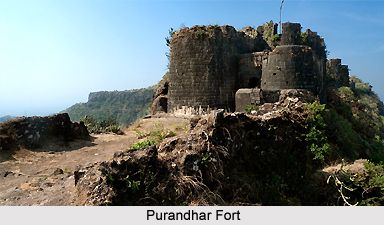 Purandhar Fort was one of the many forts captured by Shivaji in his drive towards ridding the country of the Mughal rulers. Shivaji felt very strongly about the rule of the country by an outside foreign power and consequently sought to unify the Marathas. In this bid to rally the people together against the mighty Mughal Dynasty, Shivaji looked to increase his power by capturing as much territory as he could. These conquests included a number of different forts all of which came under the control of Shivaji. The fort of Purandhar was important for Shivaji as it would help in safeguarding and protecting all the districts that were already in his hands, of which Supa was the best known.
Purandhar Fort was one of the many forts captured by Shivaji in his drive towards ridding the country of the Mughal rulers. Shivaji felt very strongly about the rule of the country by an outside foreign power and consequently sought to unify the Marathas. In this bid to rally the people together against the mighty Mughal Dynasty, Shivaji looked to increase his power by capturing as much territory as he could. These conquests included a number of different forts all of which came under the control of Shivaji. The fort of Purandhar was important for Shivaji as it would help in safeguarding and protecting all the districts that were already in his hands, of which Supa was the best known.
However, the capture of the fort of Purandhar presented certain difficulties. It was in the possession of a Brahmin, Nilkantrao, who held it together with the neighbouring lands, which he had received in "inam" from the Nizamshahs. The Brahmin had been friendly to Shivaji, his neighbour, until he died. Now the three sons of Nilkantrao who inherited the estate were warring among themselves claiming bits and pieces of the estate, with the oldest, Nilopantrao, trying to dictate terms to his two younger brothers.
Shivaji, with his usual band of Mavalis, paid a visit to Purandhar at the time of the Diwali festival. An open assault on Purandhar, a Brahmin possession, would have offended Hindu sentiment. Shivaji waited in the plains until he was invited into the Purandhar fort. When the invitation came, he said that in view of the festival he could not come alone, leaving his men behind. So everyone was invited in.
When the festivities were over, Shivaji had taken possession of the fort, though with great largesse he restored the inam lands to the three brothers who had to be content with what Shivaji gave them. This capture indicated Shivaji`s philosophy. With Hindu as with Muslim, with friend as with foe, and even with his own kith and kin, Shivaji applied the same yardstick. He intended to acquire whatever he needed to carve out an independent Hindu state. If it was not given readily to him, he was willing to use guile, and even in necessary, force. This creed, which has been responsible for the acquisition of the various forts that strengthened Shivaji`s might, was necessitated by his haste to attain his objective.



















